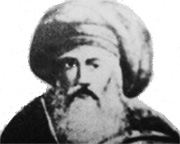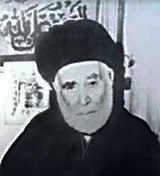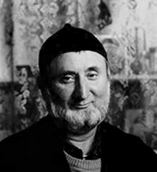Shaykh Abdul Qadir Geylani
Biography
Seyyid Muhyiddin Abu Muhammad Abdul Qadir al Geylani (also Jilani) was born in Nayf in Geylan, Persia, on the celebrated Night of Power during Ramadan in 470 AH (1077 CE). The Arabic name for the Night of Power is Laylat Al Qadr, so he was named Abdul Qadir in reference to the auspicious day on which he was born. Shaykh Abdul Qadir passed to the other side at the age of 91 on the 11th of Rabi al-Thani, 561 AH (1166 CE). His tomb is in Baghdad, where thousands of people continue to visit it daily. Hz. (for Hazreti, meaning the Honorable) Abdul Qadir Geylani's tomb is considered to be the heart of Baghdad.
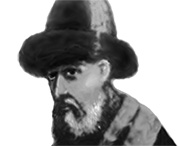 Shaykh Abdul Qadir Geylani
Shaykh Abdul Qadir GeylaniAbdul Qadir Geylani's father was Seyyid Musa Jangi Dost and his mother was Ummul Khayr Fatima bint al-Shaykh Abdullah Sumi. Because both of his parents were seyyids, or descendants of Prophet Muhammad (peace be upon him), his lineage is called the Silsiletil Zehep (Golden Chain). On his mother's side his lineage was Jemal Muhammad, Mahmut, Tahir, Ibi Ata Abdullah, Kenaleddin, Isa, Ali Alauddin, Muhammadil Jevat, Imam Ali Riza, Imam Musel Kazim, Imam Jaferils Sadik, Imam Muhammadil Bakir, Imam Ali Zeynel Abidin, Hz. Husayn, whose mother was Hz. Fatima, the daughter of Prophet Muhammad (pbuh). On his father's side, his lineage was Abdullah, Yahya Ezzhit, Muhammad, Davut, Musa, Abdullah, Musel Jun, Abdullah Mahiz, Hasenul Musemma, Hz. Hasan, whose mother was Hz. Fatima, the daughter of Prophet Muhammad (pbuh).
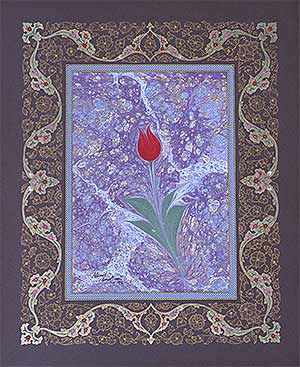
Abdul Qadir Geylani is accepted as one of the four qutbs* of all time, (aqtab-i erbaa) which is the highest spiritual station after the prophets and messengers. He was known as the Gavsul Azam (lit, Greatest Helper, The Perfect Man, the human being who has reached the highest possible level), the Pole of Power, Qutbul Rabbani (Divine or Devout Qutb), Sultanul Awliya (King of the Saints), Qutbul Azam (Greatest Qutb) and as the biggest helper of people in need.
He was also known as Bazul Eshep (The Grey Hawk). When he was ten years old, his mother told him a story. "One day some years ago I was traveling in the desert. A Bedouin in black clothing blocked the road I was on and attacked me. At that time, I started screaming for help. Suddenly, out of nowhere, a big hawk appeared, attacked the Bedouin, and kept attacking until the Bedouin fled. After that, it grabbed my headcovering and disappeared into the sky. I still wonder about this bird." Hazreti (Honorable) Abdul Qadir smiled, and left the room. A few moments later, he returned with his mother's headcovering and said, "Mother, here is your headcovering. That bird you saw was me."
Abdul Qadir Geylani received his first education in his hometown. He went to Baghdad and studied Islamic law, theology, and halvet (spiritual retreat). Hz. Geylani lived among some ruins near Baghdad for 25 years in halvet, fighting with his nafs (egoistic or animalistic nature). A contemporary source of his time said, "He has left the world completely, and for the last forty days he hasn't eaten anything."
His first shaykh was Hammad ibn Muslim al-Dabbas. Among his other esteemed teachers was Ibu Said Mubarek bin Ali Mahzumi'dir from the Hanbali school. According to one biographer, he was the person who tended Abu Hanifa's tomb.
Abdul Qadir al Geylani is one of the greatest Sufis who ever lived, one of the most talked and written about. During Geylani's lifetime, Baghdad was a cultural center for Sufism and science. Abdul Qadir al Geylani was famous in Baghdad and throughout the Islamic world for his talks, miracles, poems, and books. He has since been highly respected in the general Islamic and Sufi communities.
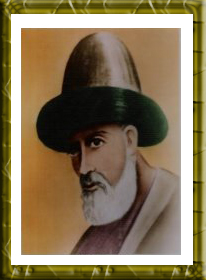 Shaykh Abdul Qadir Geylani
Shaykh Abdul Qadir Geylani
Hz. Geylani performed numerous miracles that were well recorded in his time. Because of his teachings many Christians and Jews became Muslims and many of his students became famous walis (saints) and teachers.
According to contemporary accounts, Hz. Abdul Qadir was tall and olive-skinned. He had long eyelashes, blue eyes, a beautiful face, and long hair. He was very humble and beautifully dressed. When he spoke, the audience became spellbound and enraptured by his words and personality. Love was always his guide.
* The plural of qutb in standard Arabic transliteration is aqtab (Turkish, aktab). Throughout this website we have simplified most of the Sufi terminology for first-language English speakers by adding "s" to pluralize many words, rather than burden the reader with additional terminology. Many of the correct, standard pluralizations of the original Arabic (or Turkish-Arabic) transliterations can be found in this website's glossary.

